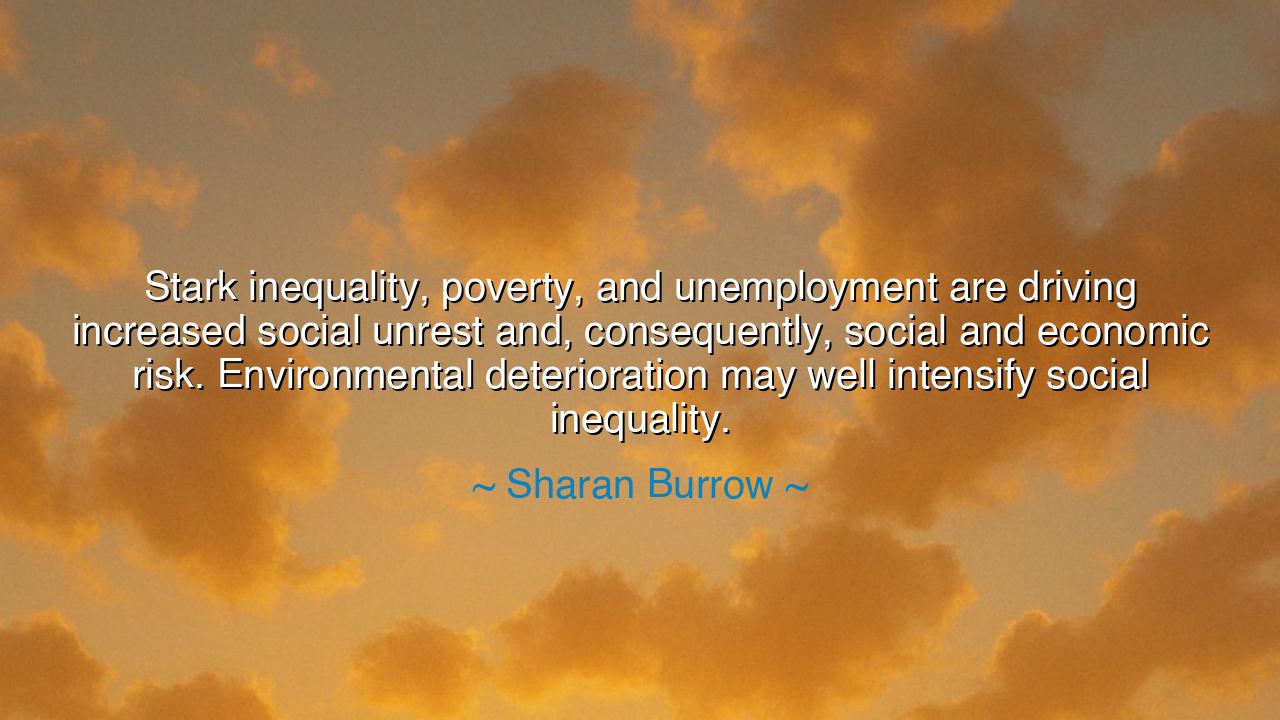
Stark inequality, poverty, and unemployment are driving increased
Stark inequality, poverty, and unemployment are driving increased social unrest and, consequently, social and economic risk. Environmental deterioration may well intensify social inequality.






The words of Sharan Burrow thunder like a warning bell at the gates of civilization: “Stark inequality, poverty, and unemployment are driving increased social unrest and, consequently, social and economic risk. Environmental deterioration may well intensify social inequality.” In this teaching, we are reminded that the wounds of society are not separate, but bound together. Where there is inequality, there is discontent. Where there is poverty, there is despair. Where there is environmental destruction, there is the widening of divides, for the weakest are always struck first and hardest. Burrow speaks as a guardian of workers, but her wisdom extends to all humanity, for the conditions she names are the very tinder that ignite the flames of unrest.
Consider first the truth of inequality. When wealth is gathered into the hands of the few, while the many labor without hope, the earth groans with injustice. The discontent of the hungry cannot be silenced forever by the comfort of the rich. History shows us again and again that when the gap between privilege and poverty grows too vast, unrest follows like thunder after lightning. It is not merely morality, but survival, that demands societies strive toward balance.
The French Revolution stands as a great witness to this truth. In the 18th century, while kings and nobles feasted, peasants starved. Bread was scarce, yet wealth was squandered on luxury. The cries of poverty and unemployment grew into the roar of rebellion. When the storm broke, no palace walls could keep out the fury of the people. And though much blood was spilled, the lesson is eternal: a society that ignores its poor, its hungry, its unemployed, builds its house upon a fault line destined to break.
Burrow warns also of the danger of environmental deterioration. The earth itself, strained and wounded, becomes a force that deepens inequality. When floods sweep across coasts, it is the poor who lose their homes first. When droughts wither fields, it is the small farmer who suffers while the wealthy import food from afar. When cities choke with pollution, it is the laborer who breathes the poison while the rich retreat to cleaner havens. Thus, destruction of the environment is not merely an ecological crisis, but a social one, for it multiplies the burdens of those already bowed by hardship.
The Dust Bowl of the 1930s gives us a vivid tale. Poor farmers, driven by economic desperation and unsustainable practices, stripped the land of its resilience. When the winds came, they carried away the very soil of life. Thousands of families fled westward, jobless and destitute. The land’s destruction was not only an ecological disaster, but a social one, casting countless into deeper poverty and unemployment. Here we see how environmental neglect does not merely scar the earth—it deepens human suffering and magnifies inequality.
From this wisdom comes a lesson both urgent and profound: justice for people cannot be separated from justice for the earth. To fight inequality without protecting the environment is to pour water into a broken vessel. To protect the environment without addressing poverty is to heal the skin while the bones still ache. True balance demands that we bind these struggles together, seeing them as one great work of human survival and dignity.
Therefore, let each of us take up this charge: stand for the poor and the unemployed, not only with words but with action. Defend the earth from deterioration, not only for beauty’s sake but for justice’s. Support leaders who seek both economic fairness and ecological wisdom. In your daily life, live with awareness that your choices—what you consume, what you waste, what you preserve—either heal or harm the balance of the world.
So, children of tomorrow, remember the warning of Sharan Burrow: inequality and environmental ruin are not separate storms, but one tempest. If left unchecked, they will tear apart the fabric of society. But if faced with courage, wisdom, and compassion, we may yet weave a future where justice and balance endure. Let this be your inheritance: a world where no one is cast aside, and where the earth itself is cherished as the foundation of all life.






AAdministratorAdministrator
Welcome, honored guests. Please leave a comment, we will respond soon